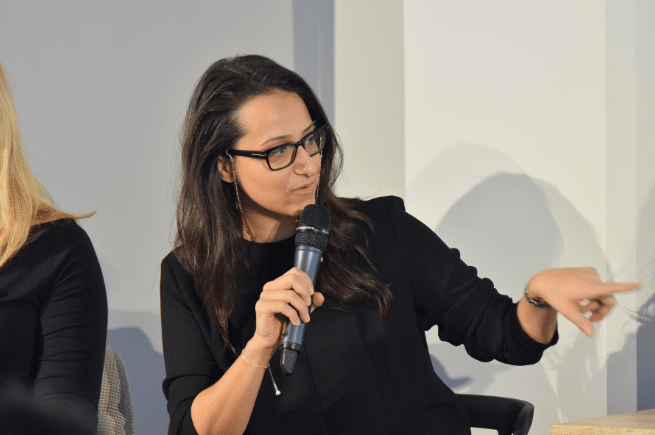Premium publishers on bid caching, the open exchange and SSPs
Unruly’s latest Trust Talks event happened on the 6 November at the Hospital Club in London. The event featured four panels, all focused on the world of programmatic. It was standing room only at this massively popular event which brought together premium publishers and advertisers for open and honest discussions to take the industry forward.
The first panel was moderated by Adweek’s Ronan Shields, and addressed the issues and opportunities facing premium publishers in 2018.
For the panel Ronan was joined by Dora Michail, MD Digital, the Telegraph, Steph Miller, Head of Sales & Marketing Services at Zoopla, Danny Spears, Programmatic Director at The Guardian and Lauren Dick, Head of Emerging Platforms at MailOnline.

Ronan Shields (RS): What do SSPs have to do to differentiate in this day and age?
Danny Spears (DS): In order to understand where this is going we need to look at where we are today. Unfortunately we are still in a position of distrust, where there is real concern from premium publishers, as well as buyers and brands, as to what happens in the intermediary layer. Once you understand and acknowledge this, then you can form a clear view of the direction of travel.
Over the past three years we’ve [the Guardian] talked about three key strategic pillars; control, transparency and value. We still pursue these three pillars today however conversations around access to our own data, and having to continuously wrestle with vendors to stop them changing auction dynamics is exhausting. We’re moving to a world where the intermediaries need to become customer centric. Bid caching is a fantastic example of something that was done to benefit an intermediary which was then shoehorned into language to justify its value to me, which I don’t see, and that is exactly the opposite of where we need to be! It comes down to serving me as a customer, weaving into my stack and becoming a really important part of my strategy.

Steph Miller (SM): I sort of agree, however I sort of disagree too! Yes, I think transparency is important however the market is saturated at the moment and in order to decide on who we want to use and test with, SSPs need to have a USP and give us a reason to test with them as it’s a long process which is difficult to do, expensive and time consuming. So you need to have a reason to try out new partners. If we hound these companies about telling us absolutely everything and not changing anything once we’ve partnered with them, then I think that stops them being entrepreneurial and coming up with new ideas, and ways in which we can work better together.
Dora Michail (DM): I think premium publishers have reached a point of saturation with regard to their ad stack. A year ago, we would have been open to having conversations about something that might interest a publisher. What interests premium publishers are ways in which they can get more value. We’re in a position where we need to take what we have and figure out ways to optimise it. What we need from our ad tech stack is ways in which we can do that, and ways in which we can find value that also translates into value for the advertiser. It has to be reciprocal in order to continue to work. I think this is key for premium publishers, and should be the main thing that SSPs care about as we move into 2019.

Lauren Dick (LD): I think, as premium publishers, we are all trying to bring advertisers closer to the supply and short circuit what is going on in between. The challenge that we have is that we’ve managed to complicate the complicated by adding layers of validation and mediation in between which blinds and confuses everyone. A lot of people didn’t understand it anyway, and we’ve now complicated it further with emerging technologies which are supposed to measure the problems that we have in the transparency of the supply chain. We’re making a further rod for our own back by putting these layers in between what should be a very simple supply chain.
RS: What do you all think of the transparency pact that the six exchanges signed? Was this just more PR, or will it have a genuine impact on the way the industry operates?
DS: I want to take a huge amount of hope from it however, my concern is that it looks like more PR. The things we’re seeing played back in those statements are the things I’ve been asking for for three years and which I’ve largely been pushed back on. This is being struck at a time when Index has been called out on bid caching, and so I suppose I question the timing, and whether it’s been done for the right reasons. I genuinely hope the parties involved are committed, however the truth is we’ll only see changes based on their behaviour. Making a statement is one thing, but the behaviour and action must follow.

LD: I still think there are a lot of flaws in other technologies that are out there. If we take the time it takes to update brand safety as an example, it doesn’t allow for the real-time ecosystem. I think that it is largely an exercise in PR. It’s great to have a start which says this is what we are trying to do but I feel like it will go the way of many other initiatives where we all talk about it, know what it is, and know we should be adhering to it but nothing actually ever gets implemented.
DS: I really believe the noise that was created around bid caching demonstrates a notable change in the way that the market behaves, which I take a huge amount of positivity from. It highlights the fact that now, if you behave in a questionable manner, then you will be called out for that behaviour. This is a fundamental shift, and a very healthy sign that the market is moving in the right direction.
RS: Do you find that the buy side want to plug directly into demand to avoid dealing with the SSPs?
DM: There are buying practices that have become the default and I believe it will take something quite significant to make those changes. Agency trading desks have spent a long time getting their tech, and the work they need to do for all their reporting, in order and we can’t underestimate the cost of switching that best practice that they’ve created for themselves. I think that’s quite a significant barrier to simplifying things because they’ve done a huge amount of work setting things up, and it works well for them.
DS: The Guardian has an appetite to control technology as a means to execute its strategy which feels fundamentally important. However, we do question the need for us to go and integrate into DSPs directly. That’s what ad exchanges are very good at. It creates this amazing opportunity for a quality ad exchange who is completely transparent and trusted by it’s customers to actually differentiate from the rest of the market. However, I suppose that does mean that it has to answer to our individual customer needs, and for me, that’s about making sure that I have access to data and that it’s woven into my strategy meaning that it becomes an inherent part of a larger engine rather than presenting itself as an engine as many ad exchanges have tried to do.
If you’d like to watch the full panel in action, check out the video below.
